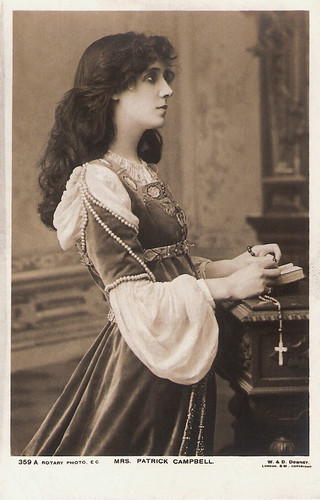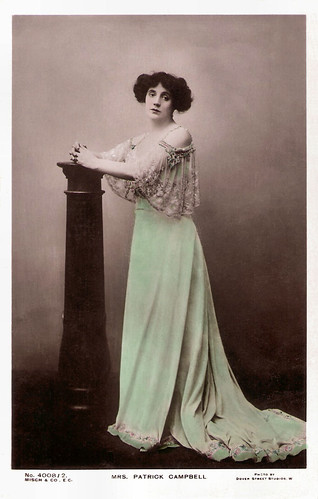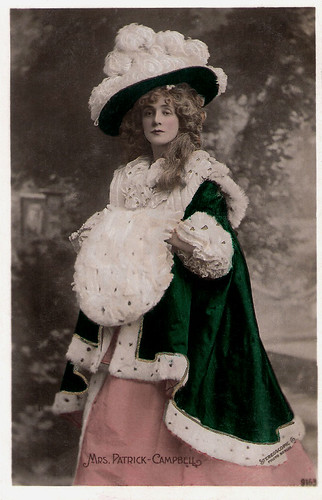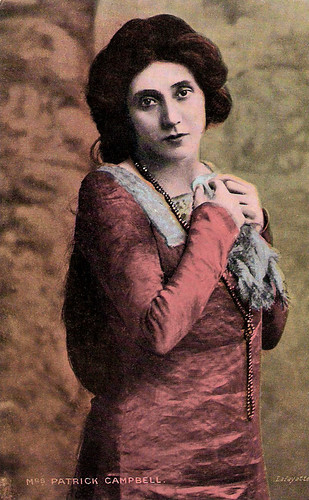
British postcard by Rotary, no. 359 A. Photo: W. & D. Downey, London.

British postcard in the Glosso-graphs series by Misch & Co., no. 4008/2. Photo: Dover Street Studios.
Juliet, Ophelia and Lady Macbeth
Mrs. Patrick Campbell was born Beatrice Rose Stella Tanner in Kensington, London, in 1865. Her parents were John Tanner and Maria Luigia Giovanna, daughter of Count Angelo Romanini. She studied for a short time at the Guildhall School of Music. She was well-known as an amateur before she made her stage debut in 1888 at the Alexandra Theatre, Liverpool, four years after her marriage to Patrick Campbell.
In March 1890, she appeared in London at the Adelphi, where she afterwards played again in 1891–1893. She became successful as a result of starring in Sir Arthur Wing Pinero's play, 'The Second Mrs Tanqueray', in 1893, at St. James's Theatre where she also appeared in 1894 in 'The Masqueraders'.
As Kate Cloud in John-a-Dreams, produced by Herbert Beerbohm Tree at the Haymarket in 1894, she made another success, and again as Agnes in 'The Notorious Mrs. Ebbsmith' at the Garrick (1895). Among her other performances were those in 'Fédora' (1895), 'Little Eyolf' (1896), and her notable performances with Johnston Forbes-Robertson at the Lyceum in the roles of Juliet in 'Romeo and Juliet', Ophelia in 'Hamlet', and Lady Macbeth (1895–1898) in 'Macbeth'.
In 1994 she married Patrick Campbell, and they had two children, Alan Urquhart ('Beo'), who was killed in WWI, and Stella, who married an American and moved to Chicago. Campbell’s own marriage ended with the death of her husband in the Boer War in 1900.
Fourteen years later, she became the second wife of Major George Frederick Myddleton Cornwallis-West, a dashing writer and soldier previously married to Jennie Jerome, the mother of Sir Winston Churchill.
British postcard by Langlier.
British postcard by The Biograph Studio, London. Sent by mail in 1902.
A grand sense of humour and outstanding charm
In 1902, Mrs. Patrick Campbell made her debut performance on Broadway in New York in Hermann Sudermann's 'Magda', a marked success.
Subsequent Broadway roles included 'The Joy of Living' (1902), as Melisande to the Pelleas of Sarah Bernhardt in Maurice Maeterlinck’s 'Pelléas et Mélisande' (1904), as Hedda Gabler in Henrik Ibsen’s play of the same name (1907), 'The Thunderbolt' (1908), 'Lady Patricia' (1911), and 'Bella Donna' (1911).
She would return to perform there on a number of occasions until 1930. She was described by one American producer as a temperamental actress whose "grand sense of humour and outstanding charm made you laugh instead of strangle her". One of her most famous quotes was " It doesn't matter what you do in the bedroom as long as you don't do it in the streets and frighten the horses."
In 1914, she played Eliza Doolittle in the original production of George Bernard Shaw's 'Pygmalion'; though much too old for the part at 49, she was the obvious choice, being by far the biggest name on the London stage, and Shaw would have seen it no other way since he wrote the play for her in particular. She and Shaw conducted a famous correspondence for many years.
Despite her second marriage, to George Cornwallis-West, she continued to use the stage name Mrs. Patrick Campbell. Her last stage appearance came in 1933.
British postcard. Sent by mail in 1905.

British postcard by Rotophot, no. 9194. Photo: Stereoscopic Co.
Astonishingly inappropriate remarks
Mrs. Patrick Campbell made her film début in the silent British film The Money Moon (Fred Paul, 1920). When the sound film came along, she went to Hollywood and appeared in The Dancers (Chandler Sprague, 1930) with Lois Moran and Mae Clarke.
She also became a speech teacher and dialogue coach and made instructional films for aspiring actors who wanted to break into sound film.
Campbell herself made some notable film appearances, including Riptide (Edmund Goulding, 1934) starring Norma Shearer, One More River (James Whale, 1934) with Diana Wynyard, and as the villainous pawnbroker in Crime and Punishment (Josef von Sternberg, 1935) featuring Peter Lorre.
She was legendary for making astonishingly inappropriate remarks. She undoubtedly lost her chance for a career in Hollywood when, at a party, she approached MGM executive Irving Thalberg, married to Norma Shearer, and said: "Dear Mr. Thalberg, how is your lovely, lovely wife with the tiny, tiny eyes?".
Mrs. Patrick Campbell died in 1940 in Pau, France, at age 75. The onset of WW II had caught her in the French Pyrenees, ill and destitute. She could not return to England because quarantine laws would have imprisoned her Pekinese, Moonbeam. Her nurse cabled Sara and Gerald Murphy for funds, which were sent but arrived too late and were used to bury the former diva in the Cimetiere Urbain at Pau.

British postcard by Rotophot, no. 9163. Photo: Stereoscopic Co.

British postcard in the National series by Millar & Lang Art Publishers, Glasgow and London. Photo: Lafayette.

George Alexander, Mrs. Patrick Campbell, Rosalie Toller and Allan Aynesworth in The Importance of Being Earnest.
Sources: Hans J. Wollstein (AllMovie), Harry Rusche (Shakespeare’s World), Encyclopaedia Britannica, Wikipedia, and IMDb.
This post was last updated on 28 August 2023.
No comments:
Post a Comment